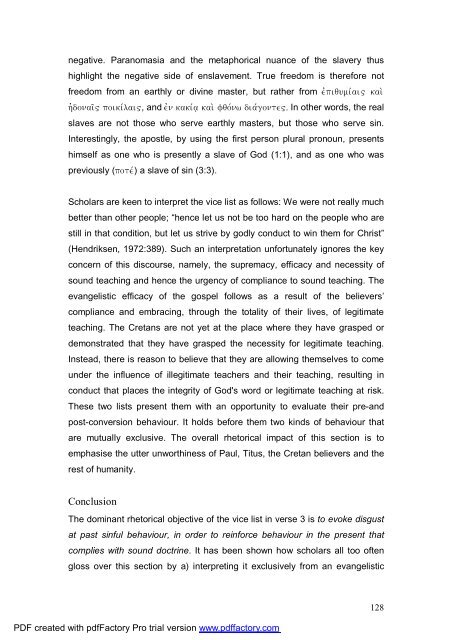A Text centred rhetorical analysis of Paul's Letter to Titus
A Text centred rhetorical analysis of Paul's Letter to Titus
A Text centred rhetorical analysis of Paul's Letter to Titus
You also want an ePaper? Increase the reach of your titles
YUMPU automatically turns print PDFs into web optimized ePapers that Google loves.
negative. Paranomasia and the metaphorical nuance <strong>of</strong> the slavery thus<br />
highlight the negative side <strong>of</strong> enslavement. True freedom is therefore not<br />
freedom from an earthly or divine master, but rather from ejpiqumivai" kai;<br />
hJdonai`" poikivlai", and ejn kakiva/ kai; fqovnw diavgonte". In other words, the real<br />
slaves are not those who serve earthly masters, but those who serve sin.<br />
Interestingly, the apostle, by using the first person plural pronoun, presents<br />
himself as one who is presently a slave <strong>of</strong> God (1:1), and as one who was<br />
previously (potev) a slave <strong>of</strong> sin (3:3).<br />
Scholars are keen <strong>to</strong> interpret the vice list as follows: We were not really much<br />
better than other people; “hence let us not be <strong>to</strong>o hard on the people who are<br />
still in that condition, but let us strive by godly conduct <strong>to</strong> win them for Christ”<br />
(Hendriksen, 1972:389). Such an interpretation unfortunately ignores the key<br />
concern <strong>of</strong> this discourse, namely, the supremacy, efficacy and necessity <strong>of</strong><br />
sound teaching and hence the urgency <strong>of</strong> compliance <strong>to</strong> sound teaching. The<br />
evangelistic efficacy <strong>of</strong> the gospel follows as a result <strong>of</strong> the believers’<br />
compliance and embracing, through the <strong>to</strong>tality <strong>of</strong> their lives, <strong>of</strong> legitimate<br />
teaching. The Cretans are not yet at the place where they have grasped or<br />
demonstrated that they have grasped the necessity for legitimate teaching.<br />
Instead, there is reason <strong>to</strong> believe that they are allowing themselves <strong>to</strong> come<br />
under the influence <strong>of</strong> illegitimate teachers and their teaching, resulting in<br />
conduct that places the integrity <strong>of</strong> God's word or legitimate teaching at risk.<br />
These two lists present them with an opportunity <strong>to</strong> evaluate their pre-and<br />
post-conversion behaviour. It holds before them two kinds <strong>of</strong> behaviour that<br />
are mutually exclusive. The overall <strong>rhe<strong>to</strong>rical</strong> impact <strong>of</strong> this section is <strong>to</strong><br />
emphasise the utter unworthiness <strong>of</strong> Paul, <strong>Titus</strong>, the Cretan believers and the<br />
rest <strong>of</strong> humanity.<br />
Conclusion<br />
The dominant <strong>rhe<strong>to</strong>rical</strong> objective <strong>of</strong> the vice list in verse 3 is <strong>to</strong> evoke disgust<br />
at past sinful behaviour, in order <strong>to</strong> reinforce behaviour in the present that<br />
complies with sound doctrine. It has been shown how scholars all <strong>to</strong>o <strong>of</strong>ten<br />
gloss over this section by a) interpreting it exclusively from an evangelistic<br />
PDF created with pdfFac<strong>to</strong>ry Pro trial version www.pdffac<strong>to</strong>ry.com<br />
128

















